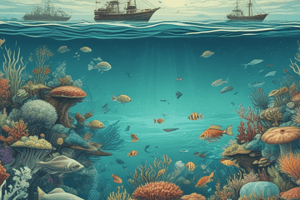Podcast
Questions and Answers
What is one of the primary reasons marine ecology is important?
What is one of the primary reasons marine ecology is important?
- It supports global biodiversity. (correct)
- It solely focuses on human benefit.
- It has no impact on terrestrial ecosystems.
- It provides recreational activities exclusively.
Which of the following factors is considered a significant component of marine ecology?
Which of the following factors is considered a significant component of marine ecology?
- The interactions among marine organisms. (correct)
- Human cultures and their historical connections to marine resources. (correct)
- Pollution from land-based sources exclusively.
- Only the physical environment of oceans.
What is a common misconception about marine ecology?
What is a common misconception about marine ecology?
- Human activity has no effect on marine life. (correct)
- Marine ecology only studies oceanic waters. (correct)
- All marine species are well understood scientifically.
- Marine ecosystems are isolated from other ecosystems. (correct)
Which of the following is not a key focus of marine ecology?
Which of the following is not a key focus of marine ecology?
How does marine ecology contribute to human welfare?
How does marine ecology contribute to human welfare?
What is a primary reason for studying marine ecology?
What is a primary reason for studying marine ecology?
How does marine ecology contribute to human health?
How does marine ecology contribute to human health?
Which aspect is not a focus of marine ecology?
Which aspect is not a focus of marine ecology?
What role do marine microorganisms play in marine ecology?
What role do marine microorganisms play in marine ecology?
Which of the following is a major threat to marine ecosystems?
Which of the following is a major threat to marine ecosystems?
Flashcards are hidden until you start studying
Study Notes
Importance of Marine Ecology
- Marine ecology is crucial for understanding the health of oceans and their ecosystems, impacting global biodiversity and climate regulation.
Significant Components
- Key factors include ocean currents, nutrient cycling, and species interactions, essential for maintaining ecosystem balance.
Common Misconception
- A widespread belief is that marine ecology only pertains to large marine animals, neglecting the importance of smaller organisms and habitats.
Focus Areas Excluded
- Specific phenomena like terrestrial animal behaviors are not central to marine ecology, which primarily studies marine organisms and environments.
Contribution to Human Welfare
- Marine ecology supports fisheries, tourism, and coastal protection, directly influencing economic stability and food security.
Reasons for Studying Marine Ecology
- Studying marine ecology aids in conservation efforts, informing policy and practices to sustain marine resources.
Contribution to Human Health
- Healthy marine ecosystems contribute to public health by providing seafood, clean water, and potential pharmaceuticals derived from marine species.
Excluded Focus Areas
- Non-marine factors, such as atmospheric or terrestrial ecology, are outside the scope of marine ecological studies.
Role of Marine Microorganisms
- Marine microorganisms are vital for nutrient cycling and serve as a foundational component of oceanic food webs.
Major Threats to Marine Ecosystems
- Significant threats include overfishing, pollution, climate change, and habitat destruction, leading to biodiversity loss and ecosystem degradation.
Studying That Suits You
Use AI to generate personalized quizzes and flashcards to suit your learning preferences.




